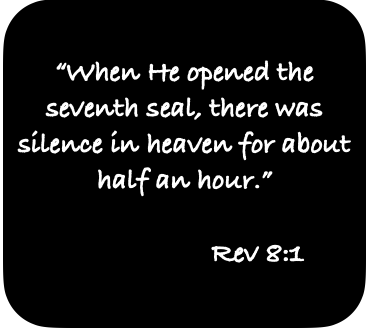The meanings of silence

In considering Revelation 8:1, "When he opened the seventh seal, there was silence in heaven for about half an hour," one finds an intriguing and somewhat perplexing passage. Silence in Heaven for about half an hour – it raises questions about who was present at that moment and to whom they might have conveyed this remarkable occurrence.
Even when I was a devout Evangelical Christian, I often contemplated the notion of Heaven and wondered if it might be a place of perpetual boredom. The prospect of eternal praise and worship never held much appeal for me personally. It's one of the advantages of adopting an agnostic perspective – it relieves one from the mental gymnastics required to fully embrace certain doctrines. Although, I must admit, psychoanalysis is not without its share of challenging concepts.
In Revelation 8:1, we are informed that the silence in Heaven precedes the revelation of the seventh seal, the nature of which remains somewhat elusive. My limited research has connected this seal to apocalyptic events, both past and future – a pattern that often mirrors the dynamics we encounter in our therapy sessions, where silence can wield significant power.
I'm reminded of a patient from my days as a clinical nurse, a man who had not spoken to any staff for nearly ten days. My role, as "the nurse who does psychotherapy," was to attempt to assist him. I arranged to meet him on the ward for a session, which extended for the full 50 minutes, during which he uttered not a single word. This pattern persisted for three more sessions. I shared the few thoughts I had and left, having tried, albeit unsuccessfully, to "do" something to aid him. Later, I learned that he believed something he had said had triggered his brother's suicide, leading him to take a vow of silence—an apocalyptic event of his own.
In another instance, a patient accused me of "weaponising silence," asserting that it wouldn't work with him. "Silence," after all, denotes an absence of noise, an experience that can be received in various ways. Some welcome it as respite, while others find it uncomfortable, leaving them alone with their thoughts. The therapeutic skill lies in allowing silence to become an integral part of the therapy, as significant as spoken words. This is precisely why I sometimes struggle with online or phone counselling – it's challenging to discern what's transpiring on the other end. Is my patient reflecting on our conversation, or has the phone lost power? Has the internet connection faltered? Such uncertainties don't arise in face-to-face sessions.
Returning to the Seventh seal of Revelation, silence often serves as a bridge for the therapist to ask, "Where have you gone?" It encourages the patient to share their thoughts, which may have remained unspoken. Silence can be a unique form of communication, a language of emotions. In these moments, I listen for distinct tones in the silence – the ring of loss, the staccato of anxiety, the muted sound of depression, or the frenzied silence of mania. Each carries its own resonance, and the adept therapist, like a discerning parent, learns to recognize the individual's "sound of silence."
In conclusion, whether in the celestial silence of Revelation or the therapeutic silence of our sessions, silence has the power to reveal, to connect, and to convey emotions that may remain unspoken in words. It's a profound tool in the therapist's kit, allowing us to listen not only to what is said but also to the unspoken language of the human soul.
Don't give up







